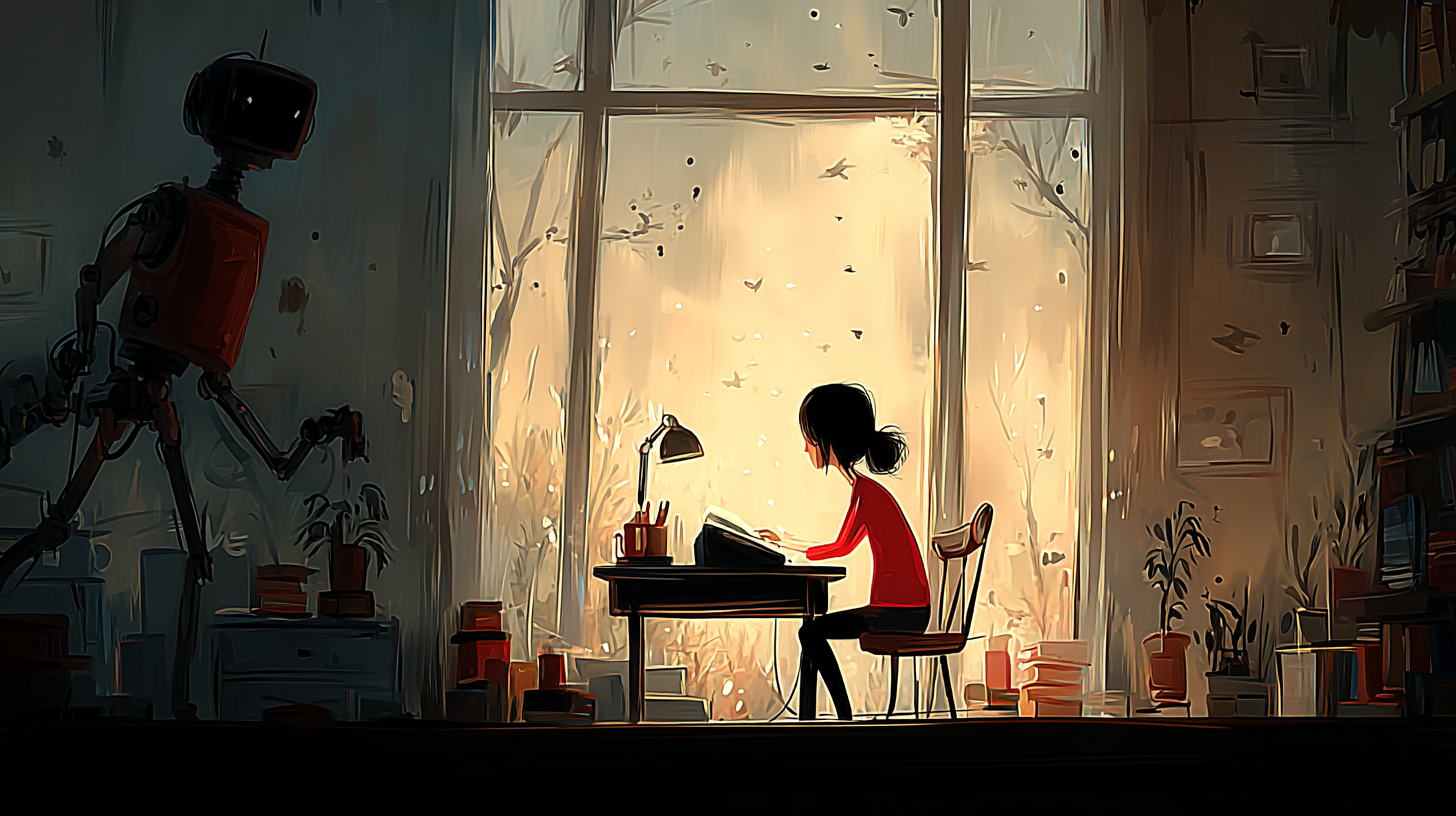“Fiction” means a story that is not real.
「fiction」は、作り話やウソ、小説のことです。
以下は英単語 “fiction” に関するストーリー型学習コンテンツです。まずは大枠の意味を理解して最後の文章で確認しましょう。
主な意味(main meaning)
| 品詞 | 意味 | 発音記号 | 英語例文 |
|---|---|---|---|
| 名詞 (noun) | 作り話、小説 | /ˈfɪk.ʃən/ | She loves reading science fiction novels. |
語源(etymology)
ラテン語の「fictio(作ること、形作ること)」が語源。
「fiction」の核イメージは「作られたもの」「現実ではない話」。
類義語(synonyms)
| 類義語 | 英語例文 |
|---|---|
| novel | She wrote her first novel when she was twenty. |
| tale | The children listened to the fairy tale quietly. |
| fantasy | Harry Potter is a popular fantasy series. |
| myth | The story about the dragon is just a myth. |
| fabrication | His story about winning the lottery was a complete fabrication. |
反義語(antonyms)
| 反義語 | 英語例文 |
|---|---|
| fact | What he said is not fiction but a proven fact. |
| reality | Sometimes, reality is stranger than fiction. |
コロケーション(collocations)
| コロケーション | 英語例文 |
|---|---|
| science fiction | I enjoy science fiction movies about space. |
| work of fiction | This book is a work of fiction and not based on real events. |
| historical fiction | She reads a lot of historical fiction about ancient Rome. |
| crime fiction | He writes crime fiction full of twists and turns. |
| fiction writer | The fiction writer won an award for her latest book. |
2項表現(binomials)
| 2項表現 | 英語例文 |
|---|---|
| fact and fiction | The documentary mixes fact and fiction. |
| truth and fiction | It’s hard to separate truth and fiction in his stories. |
英語ストーリー(english story)
Title: “More Than Just Fiction”
Emma was a young fiction writer who loved creating new worlds. Her favorite genre was science fiction, and she spent hours imagining life on other planets. One day, she decided to write a new work of fiction about a robot who wanted to become human.
While doing research, Emma read many books. Some were based on fact, others were pure fantasy. She sometimes found it hard to separate truth and fiction, but she enjoyed the process. She even read some historical fiction to help build a more realistic world.
Emma’s best friend, Jake, preferred crime fiction, but he promised to read her story. When he finished it, he said, “This isn’t just a good novel. It feels real. It blurs the line between reality and imagination.”
Emma was happy. She had turned her fabrication into something that touched people’s hearts. She realized that even if her stories were not true, they still had the power to inspire.
和訳
タイトル:「ただの作り話じゃない」
エマは若い**小説家(fiction writer)で、新しい世界を作るのが大好きでした。彼女が一番好きなジャンルはSF(science fiction)で、他の惑星での生活を何時間も想像していました。ある日、エマは「人間になりたいロボット」についての作り話(work of fiction)**を書くことに決めました。
エマは資料を集めるために多くの本を読みました。あるものは**事実(fact)に基づき、他のものは完全な空想(fantasy)**でした。**真実と作り話(truth and fiction)の区別が難しいこともありましたが、その過程を楽しんでいました。リアリティのある世界を作るために歴史小説(historical fiction)**も読みました。
エマの親友ジェイクは**犯罪小説(crime fiction)の方が好きでしたが、彼女の物語を読むと約束してくれました。読み終えると、彼は言いました。「これはただのいい小説(novel)**じゃない。本物みたいだ。**現実(reality)**と想像の境目があいまいだね。」
エマはとても嬉しくなりました。彼女の**作り話(fabrication)**が、人の心を動かすものになったのです。たとえ本当の話でなくても、物語には人を感動させる力があると、彼女は気づきました。
Q&A
- Q「fiction」と「novel」の違いは何ですか?
- A
「fiction」は「作り話」全般を指し、小説、短編、小話など広い範囲を含みます。一方、「novel」は特に長編小説を意味します。つまり、「novel」は「fiction」の中の一つの形式です。
- Q「fiction」と「tale」の違いは何ですか?
- A
「tale」は「話」「物語」を意味し、特に昔話や教訓のある話によく使われます。「fiction」はより広く現代小説や創作全般を指します。例:おとぎ話は「fairy tale」、現代小説は「fiction」。
- Q「fiction」と「fantasy」の違いは何ですか?
- A
「fantasy」は「魔法・非現実的な世界」を含む物語(例:ドラゴン、魔法、異世界など)を意味します。一方、「fiction」は現実的な話でも、非現実でも、どちらでも含みます。つまり「fantasy」は「fiction」の中のサブジャンルです。
- Q「fiction」と「myth」の違いは何ですか?
- A
「myth(神話)」は昔の文化や宗教に基づく伝説で、しばしば神や英雄が登場します。「fiction」は現代の創作全般を指し、宗教的な意味合いは基本的にありません。
- Q「fiction」と「fabrication」の違いは何ですか?
- A
「fabrication」は「でっちあげ」「ウソ」という意味が強く、事実のように見せかけたウソに使います。「fiction」は創作やエンタメ目的の「作り話」で、ウソとして人をだます意図はありません。
- Q「science fiction」と「historical fiction」は何が違いますか?
- A
「science fiction(SF)」は未来・宇宙・科学技術などをテーマにしたフィクションです。一方、「historical fiction(歴史小説)」は過去の歴史に基づいていますが、登場人物や出来事の一部が創作です。両方とも「fiction」のジャンルですが、舞台やテーマが違います。
- Q「crime fiction」は普通の「fiction」とどう違いますか?
- A
「crime fiction」は犯罪を中心にした作り話で、探偵、事件、犯人探しなどが含まれます。普通の「fiction」は恋愛、友情、家族、冒険など、幅広いテーマがあります。
- Q「fiction writer」と「novelist」の違いは?
- A
「fiction writer」は作り話を書く人全般を指します。短編、長編、SF、ファンタジーなどジャンルは問いません。「novelist」は小説(novel)を書く人を特に指します。



コメント